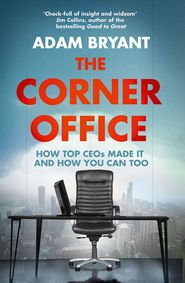скачать книгу бесплатно
“Learning how to delegate, learning how to let go and still make sure that everything happened, was a very important lesson in my first role in management. And that’s where I learned a principle that I apply today – I don’t micromanage, but I have micro-interest. I do know the details. I do care about the details. I feel like I have intimate knowledge of what’s going on, but I don’t tell people what to do. Every day I read about a thousand pages of documents, whether grants or letters or scientific articles, or what ever. I have learned what the critical things to read are. If there are ten tasks in an overall project, what is the most critical task among those ten? What is the one thing that everything else hinges on? And what I’ll do is I’ll spend a lot of time understanding that one thing. Then, when the problem occurs, it usually occurs there, and I can be on top of what the problem is. It’s just having enough experience to understand when problems do occur and how they occur, why they occur, and being prepared for that particular problem. Problems can occur in the other ten areas, but they won’t determine the outcome of the overall project. But there may be one or two points where the outcome of the entire project is at stake, and you’d better be on top of it.”
Meridee Moore of Watershed Asset Management looks for that ability to simplify when she’s assessing job candidates.
“We give people a two-hour test,” she said. “We try to simulate a real office experience by giving them an investment idea and the raw material, the annual report, some documents, and then we tell them where the securities prices are. We say, ‘Here’s a calculator, a pencil, and a sandwich. We’ll be back in two hours.’ If an analyst comes in there and just attacks the project with relish, that’s a good sign. After two hours, two of us go in and just let the person talk about what he’s done. The nice thing about my being trained as a lawyer, and never going to business school, is that I’m able to ask the basic financially naïve questions, like: ‘What does the company do? How do they make money? Who are their customers? What do they make? How do they produce it?’ That throws some people off.
“Often, analysts go right to the financials and forget to think about the company’s business model. If the person avoids answering the basic questions and instead changes the subject to talk about the work they did, that tells me the person is a bit rigid. Instead of trying to respond to what’s being asked, they’re trying to get an A on the test. Also, if they’re a little too worried about pleasing me, that’s not good, either, because it’s not a please-the-boss competition. The point of the exercise is to make sure that we’ve thought about the issues critically, so we are in a position to make a good investment decision. The other quality we look for is whether the person can distill a lot of very complicated information down to its essence. Can you figure out the three or four issues that are most important for understanding this investment? Or do you get distracted by aspects of the company that really have nothing to do with making an investment or determining value?”
Вы ознакомились с фрагментом книги.
Для бесплатного чтения открыта только часть текста.
Приобретайте полный текст книги у нашего партнера:
